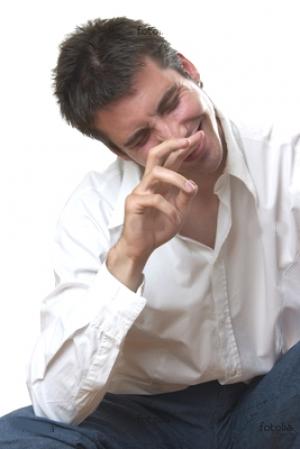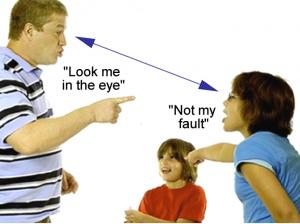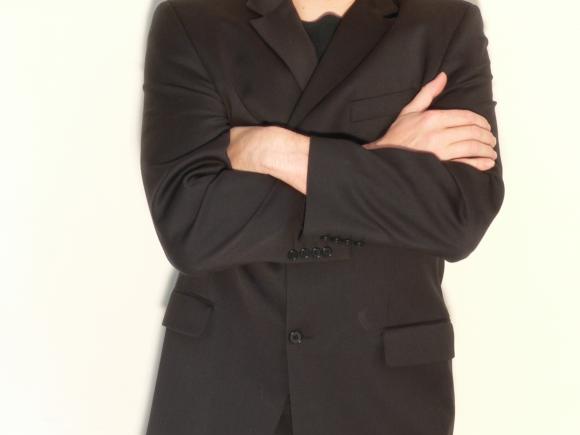Peter Clayton looks at some of the most common misunderstandings in the light of new analysis, and what this recent research can now tell us about how we communicate.
About half the questions I get asked at conferences or by email concern elements of body language that people are confused about, such as folding arms being defensive and eye contact meaning concealment.
It is understandable, because many articles have been written in the past that indicate these are signals that can be read easily and mean something definitive. However, more research has been done on body language in the last five years than in the previous 50 years and it is now believed that some of the original thinking behind certain gestures was over-simplified.
In this article we will look at a few misconceptions.
Arms folded
"When someone folds their arms are they being defensive?"
No. Folded arms can mean a number of things, from being defensive to bored, irritated, happy, confused, content or worried and I am sure the list could go on. It is even possible that someone could be cold. So without other signals to accompany the gesture, which would then be part of a cluster, someone just folding their arms means they may just have folded their arms.
Eye contact
“Should you look somone straight into the eyes?”
As children we were sometimes told to "look me in the eye and tell me what happened." As we grew up we believed that looking someone straight into the eyes was a sign of honesty and sincerity.
The majority of us maintain eye contact into the general area of the face about 70% of the time (not straight into the eyes as it can be intimidating). If you ask someone an awkward question that they are unprepared for,their eye contact is likely to shoot up to 100% in an attempt to convince you they are being honest. Staring someone into the eyes whilst having a rigid posture is usually an attempt to convince you they are telling the truth.
It is therefore helpful at the beginning of any conversation to talk about mundane things, travel, traffic, the weather, weekends, etc to gauge how much eye contact you are receiving. If it varies during a later conversation, along with other gestures, there could be an issue that you may want to ask questions about.
Note: Reading someone’s body language and seeing awkward signals is a sign of an issue that may or may not need to be investigated. It does not necessarily mean that someone is lying. They could be exaggerating, playing down their involvement in something, or even considering that you do not need to hear the whole story, perhaps it is too long to explain. So when you see a number of gestures, Think: Issue and Think: Shall I talk about it?
Eyes down
“Is it true that when someone drops their eyes they could be concealing something?"
Looking down during a conversation is often thought of as lying and it may be that someone is, but it is just as likely to be that they are feeling uncomfortable or embarrassed about something. There are those who do not actually like looking in other people’s eyes as they feel uncomfortable or believe it will make the other person feel uncomfortable.
You cannot trust a fast-talking salesman
“They all sound the same and say the same things as if they are reading from a script.”
Again – not true. When someone has said the same thing over and over again, whether it is a greeting or an answer to an objection, the subconscious mind has learnt the lines in much the same way as an experienced driver does not have to concentrate on changing gear. It happens instinctively. In the case of the ‘fast-talking’ person, the voice speeds by about 10-15% to about 150 words per minute and in doing so their voice changes tone and loses inflection which may be just enough to give some people the impression of insincerity.
So as a tip for those of you in sales, try taping the comments you use on a regular basis and listen to how they sound. Very small pauses somewhere in the sentence can put things back on track.
I see people rubbing their nose or face or covering their mouth when talking. Is that a body language signal that they are lying?
This does not come under the heading of misconception but I do get asked it a lot. I mentioned that we talk at about 100-150 wpm but we think at about 800 wpm. If someone feels uncomfortable and is perhaps going to avoid giving a complete answer, they feel slightly awkward which in turn raises the temperature very slightly. This brings blood to the surface of the skin – although you won’t see it in the same way as someone blushing. This causes them to rub the base or the side of the nose or above an eye. If they rub the base of the nose they will inadvertently cover their mouth. It does not mean they are lying, but they are saying one thing and thinking another.

So in conclusion think
Clusters. A cluster is a number of pieces of body language that occur together within a short space of time after something bold has just been said. It may be a nose touch, eyes have dropped and the person has become a little bit more solid, and when you ask a question you notice their voice volume has also dropped. These are three or four items together that are different from what you had been seeing a few minutes earlier. This will tell you there is an issue that you might want more information about.
I usually ask a question when I see a cluster, such as "It may be that you agree with me, but there are certain things that you would do differently. Do you have any thoughts?" If the body signals that you have observed are correct it is possible that they will come back with "Actually, since you mention it, we do things slightly different here and…"
I am sure you will have other FAQs or thoughts on the subject, so please let me have them and I will do my best to answer them next month.
Peter Clayton is a leading body language expert, speaker and trainer as well as a consultant for the BBC and ITV. He writes for a wide range of national papers and magazines and is a specialist consultant to other speakers, leading businesses, celebrities and politicians. For more information, visit his website: www.peterclayton.com
Peter Clayton looks at some of the most common misunderstandings in the light of new analysis, and what this recent research can now tell us about how we communicate.
About half the questions I get asked at conferences or by email concern elements of body language that people are confused about, such as folding arms being defensive and eye contact meaning concealment.
It is understandable, because many articles have been written in the past that indicate these are signals that can be read easily and mean something definitive. However, more research has been done on body language in the last five years than in the previous 50 years and it is now believed that some of the original thinking behind certain gestures was over-simplified.
In this article we will look at a few misconceptions.
Arms folded
"When someone folds their arms are they being defensive?"
No. Folded arms can mean a number of things, from being defensive to bored, irritated, happy, confused, content or worried and I am sure the list could go on. It is even possible that someone could be cold. So without other signals to accompany the gesture, which would then be part of a cluster, someone just folding their arms means they may just have folded their arms.
Eye contact
“Should you look somone straight into the eyes?”
As children we were sometimes told to "look me in the eye and tell me what happened." As we grew up we believed that looking someone straight into the eyes was a sign of honesty and sincerity.
The majority of us maintain eye contact into the general area of the face about 70% of the time (not straight into the eyes as it can be intimidating). If you ask someone an awkward question that they are unprepared for,their eye contact is likely to shoot up to 100% in an attempt to convince you they are being honest. Staring someone into the eyes whilst having a rigid posture is usually an attempt to convince you they are telling the truth.
It is therefore helpful at the beginning of any conversation to talk about mundane things, travel, traffic, the weather, weekends, etc to gauge how much eye contact you are receiving. If it varies during a later conversation, along with other gestures, there could be an issue that you may want to ask questions about.
Note: Reading someone's body language and seeing awkward signals is a sign of an issue that may or may not need to be investigated. It does not necessarily mean that someone is lying. They could be exaggerating, playing down their involvement in something, or even considering that you do not need to hear the whole story, perhaps it is too long to explain. So when you see a number of gestures, Think: Issue and Think: Shall I talk about it?
Eyes down
“Is it true that when someone drops their eyes they could be concealing something?"
Looking down during a conversation is often thought of as lying and it may be that someone is, but it is just as likely to be that they are feeling uncomfortable or embarrassed about something. There are those who do not actually like looking in other people's eyes as they feel uncomfortable or believe it will make the other person feel uncomfortable.
You cannot trust a fast-talking salesman
“They all sound the same and say the same things as if they are reading from a script.”
Again – not true. When someone has said the same thing over and over again, whether it is a greeting or an answer to an objection, the subconscious mind has learnt the lines in much the same way as an experienced driver does not have to concentrate on changing gear. It happens instinctively. In the case of the 'fast-talking' person, the voice speeds by about 10-15% to about 150 words per minute and in doing so their voice changes tone and loses inflection which may be just enough to give some people the impression of insincerity.
So as a tip for those of you in sales, try taping the comments you use on a regular basis and listen to how they sound. Very small pauses somewhere in the sentence can put things back on track.
I see people rubbing their nose or face or covering their mouth when talking. Is that a body language signal that they are lying?
This does not come under the heading of misconception but I do get asked it a lot. I mentioned that we talk at about 100-150 wpm but we think at about 800 wpm. If someone feels uncomfortable and is perhaps going to avoid giving a complete answer, they feel slightly awkward which in turn raises the temperature very slightly. This brings blood to the surface of the skin - although you won't see it in the same way as someone blushing. This causes them to rub the base or the side of the nose or above an eye. If they rub the base of the nose they will inadvertently cover their mouth. It does not mean they are lying, but they are saying one thing and thinking another.

So in conclusion think
Clusters. A cluster is a number of pieces of body language that occur together within a short space of time after something bold has just been said. It may be a nose touch, eyes have dropped and the person has become a little bit more solid, and when you ask a question you notice their voice volume has also dropped. These are three or four items together that are different from what you had been seeing a few minutes earlier. This will tell you there is an issue that you might want more information about.
I usually ask a question when I see a cluster, such as "It may be that you agree with me, but there are certain things that you would do differently. Do you have any thoughts?" If the body signals that you have observed are correct it is possible that they will come back with "Actually, since you mention it, we do things slightly different here and…"
I am sure you will have other FAQs or thoughts on the subject, so please let me have them and I will do my best to answer them next month.
Peter Clayton is a leading body language expert, speaker and trainer as well as a consultant for the BBC and ITV. He writes for a wide range of national papers and magazines and is a specialist consultant to other speakers, leading businesses, celebrities and politicians. For more information, visit his website: www.peterclayton.com


 So in conclusion think Clusters. A cluster is a number of pieces of body language that occur together within a short space of time after something bold has just been said. It may be a nose touch, eyes have dropped and the person has become a little bit more solid, and when you ask a question you notice their voice volume has also dropped. These are three or four items together that are different from what you had been seeing a few minutes earlier. This will tell you there is an issue that you might want more information about.
So in conclusion think Clusters. A cluster is a number of pieces of body language that occur together within a short space of time after something bold has just been said. It may be a nose touch, eyes have dropped and the person has become a little bit more solid, and when you ask a question you notice their voice volume has also dropped. These are three or four items together that are different from what you had been seeing a few minutes earlier. This will tell you there is an issue that you might want more information about. 

 So in conclusion think Clusters. A cluster is a number of pieces of body language that occur together within a short space of time after something bold has just been said. It may be a nose touch, eyes have dropped and the person has become a little bit more solid, and when you ask a question you notice their voice volume has also dropped. These are three or four items together that are different from what you had been seeing a few minutes earlier. This will tell you there is an issue that you might want more information about.
So in conclusion think Clusters. A cluster is a number of pieces of body language that occur together within a short space of time after something bold has just been said. It may be a nose touch, eyes have dropped and the person has become a little bit more solid, and when you ask a question you notice their voice volume has also dropped. These are three or four items together that are different from what you had been seeing a few minutes earlier. This will tell you there is an issue that you might want more information about. 



